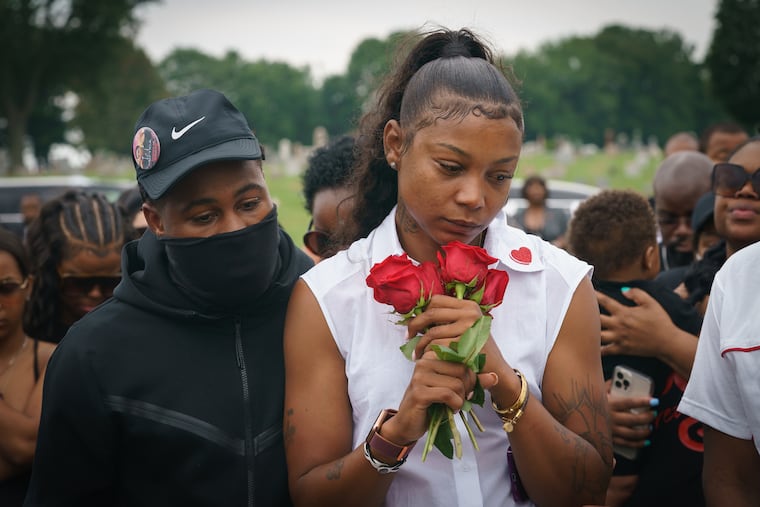Mothers confront the West Philly gang member who killed their sons: ‘I will never forgive you’
Arshad Curry was sentenced to 42½ to 85 years in prison for the murders of K.J. Johnson, Tommie Frazier, and Sidney Sessoms.

Arshad Curry did not look at the mothers of the young men he killed as he sat in the courtroom Friday, waiting to be sentenced to decades in prison.
He kept his head down and his eyes closed as Brenda Barksdale, the mother of 18-year-old Tommie Frazier, whom Curry shot and killed in July 2021, shouted that she would never forgive him for what he had done.
He remained still as she proclaimed, nearly breathless, that she hoped he would “rot deep in the depths of hell.”
His composure appeared to break only once — when Emily Johnson, whose 16-year-old son, K.J., was killed alongside Frazier, told Curry that he had done to his own mother what he did to her.
“You took her child away from her,” Johnson said.
At that, Curry opened his eyes and winced.
The emotional day of testimony was part of a sentencing three years in the making, after Curry pleaded guilty last fall to shooting five people in 2021 — three fatally — and firing shots at two police officers. It was a series of crimes, prosecutors say, that was part of a ruthless and ongoing gang war in West Philadelphia, and Curry was one of the group’s key gunmen.
His first victims were Johnson and Frazier, who were on their way to basketball practice in July 2021 when Curry pumped their car full of 10-millimeter bullets, killing them almost instantly, and injuring another teen. The young men, Curry would later say, were not his intended targets.
Then, two months later, there was Sidney Sessoms, a 19-year-old rival whom Assistant District Attorney Cydney Pope said Curry had been hunting for weeks.
Sessoms’ family, Pope said, had moved away from West Philadelphia to Port Richmond, seeking safety from the ongoing feud. But Curry went to extraordinary lengths to find them, she said — he canvassed their new neighborhood with a photo of Sessoms’ mother, asking corner stores and neighbors if they had seen the woman or knew where she lived.
Eventually, Curry found them, and one afternoon in September 2021, he and another gunman fired multiple shots through their front door and into their living room. Sessoms was killed, and his father was critically wounded. When nearby police responded to the scene, Curry shot at them, too, but missed. He was arrested at the scene.
The Sessoms family continues to live in such fear, Pope said, that they could not bring themselves to attend Friday’s sentencing.
» READ MORE: How a mother, thrust into a West Philly gang war, defended her son at all costs
Curry’s attorney, Derek Steenson, tried to convey that his client was a product of his environment — a young man whose life spiraled after he lost his father and brother to homicide as a child, then fell in with the wrong crowd. Curry, he said, was hospitalized four times for mental health crises, began self-medicating with drugs before age 13, and spent time in various juvenile detention centers. Steenson estimated that Curry has lost more than 20 people in his life to homicide.
“His entire life has been defined by violence,” Steenson said.
And yet, the prosecutor noted, “There are unfortunately lots of people who lost family members and do not become what Arshad Curry becomes.”
Finally, it was Curry’s turn to speak. His words were few.
“I’m sorry. There’s nothing I can say to ease your heart,” he said to the families. “I really deserve everything that I get.”
Common Pleas Court Judge Diana Anhalt, though, said she was not convinced of his remorse. She had seen his posts on social media in the months leading up to the sentencing, where he bragged about the people he’d killed.
For that — on top of the killings, the judge said, he would spend 42½ to 85 years in prison.
Even at that, Curry did not react. He was escorted out of the courtroom by sheriffs to the sounds of sobs from the families of the victims.
Johnson’s and Frazier’s families sat and stared ahead. For more than three years, they had been awaiting this moment, to face the man who ruined their lives, to step away with a sense of justice and closure.
But the day, they said, offered little of that.
“There are no winners,” Johnson said.
She would probably never feel true closure, she said. She, like the mothers of Frazier, Sessoms, and even Curry, was left only with heartbreak and fading memories.